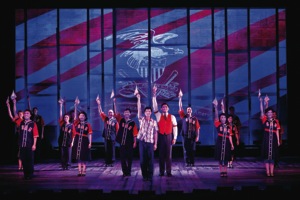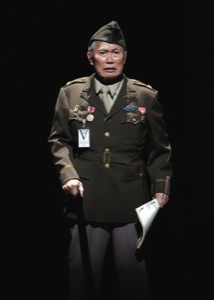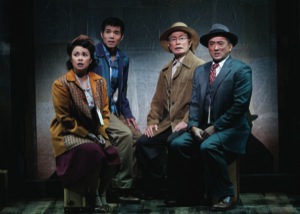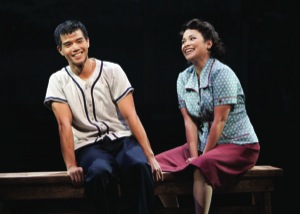
‘Allegiance’ has some kinks, but is still enjoyableOriginal shows don’t come along all that often these days. Sure, The Old Globe and La Jolla Playhouse have nurtured some fine award-winning musicals and plays through the years, but compared to the many revivals and shows surrounding known music on Broadway, an original musical is hard to come by.
It’s even tougher to find one that is good and one that leaves you wanting more.
Allegiance, a new American Musical, got its world premiere at The Old Globe last month. It tells the story of a Japanese family living in Salinas, Calif. and how they are forced to sell their home and move to an internment camp during the weeks and years following Pearl Harbor.
The story starts in the present day when an old man named Sam Kimura (George Takei) is visited by a woman who brings him news that his sister Kei (Lea Salonga) has passed away, a sister he hasn’t spoken to in more than sixty years. He is angry, embittered and dismissive and barely gives the few things Kei has left him a passing glance.
As he reluctantly sifts through the items she has left him her spirit appears beckoning him back to his childhood. Back to when he was known as Sammy (Telly Leung) and still in high school dreaming of a better life. The family dynamic is quickly established as we see how Sammy struggles to connect with his father (Paul Nakauchi) and how his sister dotes on him like the mother he never had. His grandfather, Ojii-san (Takei), is the quiet yet wise old man who only speaks his mind when necessary.

As World War II breaks out, all Japanese Americans are forced to sell their homes and move to internment camps. Sam and his family are relocated to one in Wyoming. They go from living a comfortable life to living in shared quarters, something they are not used to.
It is in the camp that Sammy meets Hannah (Allie Trimm), a young American nurse and Kei meets Frankie (Michael K. Lee), a Japanese American also in the camp. Within time love blossoms for both couples, though Frankie and Sammy don’t see eye to eye.
Sammy does all he can to make himself useful to his family and to the camp. He offers to join Mike Masaoka (Paolo Montalban), the national secretary and field executive of the Japanese American Citizens League, to prove his loyalty to America by joining the military and fighting for his country. Frankie, on the other hand, completely disagrees with this and has no problem making that known.
The action deftly moves from internment camp, to the battlefield, and from the mess halls to the infirmary. Director Stafford Arima definitely keeps the action moving and the scenes move swiftly and effortlessly from one to the next.
Scenic design by Donyale Werle is fascinating and artistically gratifying, as is the lighting design by Howell Binkley.

Jay Kuo’s music and lyrics hits many high notes, but also some clinkers in the two and a half hour show. For instance much of the mood in the first half of the show is somber and tense yet most of the written music during that time, while good, seemed out of place. The first song that really grabs you and doesn’t let go is “Ishi Kari Ishi” a simple but sweet song between Kei and her grandfather. It’s sweet, tender and full of heart and is really the first time we see or hear that in the show.
The number that follows is “Higher” and shows why Salonga won that Tony award for Miss Saigon. She has an amazing voice and she is a joy to watch.
There’s a great duet/trio in Act 1 when Sammy and Hannah join a big band singer (Brandon Joel Maier) in the number “With You.” Maier’s vocals mix quite well with both Leung and Trimm and it’s a pretty tune and arranged perfectly.
Lee gets to show his vocal chops in the song “Paradise” and while most of Leung’s songs are not the most memorable, his voice is.
The rest of the first act is great, actually. The music and lyrics fit perfectly with the mood of the show all the way up to the closing of Act 1 and that continues on through most of Act 2.

The entire cast stands out vocally and the sound that emits when the full ensemble sings is breathtaking, thanks to Music Director Laura Berquist. Her work here, on Emma and previous touring productions shows both on stage and in the pit.
Andrew Pallermos’ choreography is fitting, athletic and inventive and his opening number movements are great.
Nakauchi’s Tatsuo is amazing to watch as is Takei’s Ojii-san. Both men are such grounded actors that you get lost in their characters whenever they speak.
Nakauchi is strict and forceful, but you can see why he is the way he is even when the dialogue isn’t there. And what can you say about Takei? His comedic timing never lets us down and when he has a tender moment to play, there isn’t a dry eye in the house.
Allegiance will most surely make its way to Broadway, and between now and then, as with most original shows, it will go through a series of changes and rewrites making it a better show. But see it now when you don’t have to spend the money on a flight and hotel in New York. The cast alone is worth the ticket price.











